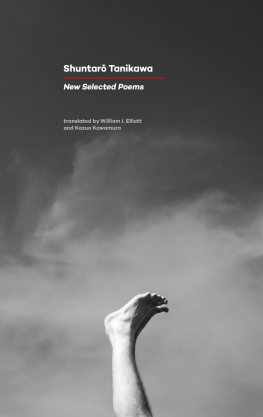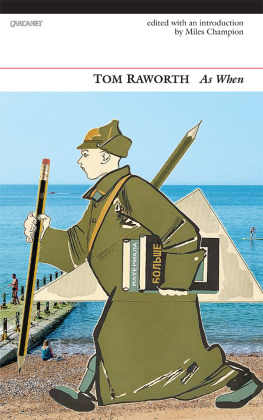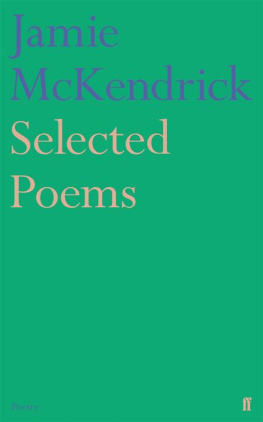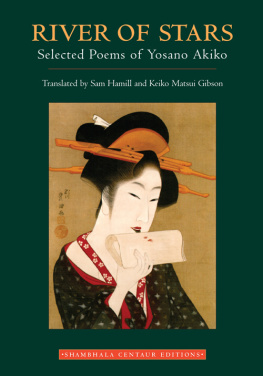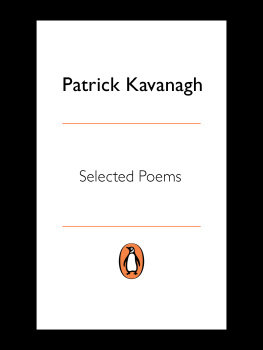New Selected Poems
Shuntar Tanikawas sixty-odd collections of poems have received awards in England, China, Japan and the United States, including the 1988 American Book Award. He translated the Mother Goose Rhymes and, for several decades, the celebrated comic strip Peanuts. Having read at festivals on three continents and in numerous countries, Tanikawa has achieved a reputation as not only one of the most popular but also one of the most inventive Japanese poets of the modern age. William I. Elliott and Kazuo Kawamura are professors emeriti of English Literature at Kanto Gakuin University in Yokohama, Japan. They have translated Tanikawa continuously since 1968.
SHUNTAR TANIKAWA
New Selected Poems
Translated by William I. Elliott and Kazuo Kawamura

Contents
Timeless Tanikawa
Shuntar Tanikawa is preeminent among active Japanese poetic volcanoes; or among active poetic volcanoes world-wide, for that matter. Is there a better analogy for describing the career of a poet who between the ages of twenty-one and eighty-two has produced in excess of sixty mature collections across these sixty-one years? Volcanoes peak; and may peak again. One study indicates that most poets peak between the ages of twenty-six and thirty-one. By a rough estimate Tanikawa has, to date, peaked, say, a dozen times and he gives no sign of calling it quits.
Two-Billion Light-Years of Solitude (1952) and
62 Sonnets (1953) confronted a Japanese readership with poems unlike any they had ever seen, much less from a young man just a year or two out of his teens.
Two-Billion Light-Years of Solitude (1952) and
62 Sonnets (1953) confronted a Japanese readership with poems unlike any they had ever seen, much less from a young man just a year or two out of his teens.
He began, as it were, with twinned eruptions, this entirely unexpected poet. Having been, at eighteen, asked by his academician father just what, since he had determined not to enter university, he proposed doing with his life, he answered that, well, he might just give poetry a try; whereupon he produced the two notebooks he had filled with poems he had begun writing at eighteen or nineteen. Although he himself lacked perfect confidence, his father Tetsuzo was not unimpressed with what he read and so he put them in the hands of poet-editor Tatsuji Miyoshi, who was also not unimpressed, and thus began the career of the poet who would become the most productive in all of Japanese poetic history. At this writing (in October 2015) something like the sixtieth Tanikawa collection of mature poems has just been published: Children of the Future (2014) has been, like all the other mature volumes, translated by Kazuo Kawamura and me and awaits its turn in joining the twenty-odd already available in English versions. It should be noted that Tanikawa also has many childrens poetry books in print. The odds are that even as this Carcanet expanded Selected Tanikawa is being published another collection will have appeared, besides a couple of other sorts of books (essays, interviews, plays and whatnot).
The translators are reluctantly confident that this will be the case. That Tanikawas personal stylistic sensibility and his general take on poetry are new is not attributable to the fact that his fathers favourite book of Western poems was Leaves of Grass. Nor was there a complete break with Japanese poetic sensibility, traditions or practices. A few other Japanese poetic forms notwithstanding, it is the case that waka and haiku emerged as the overwhelmingly dominant forms and remained so well into the twentieth century. Bear in mind that at some point or other millions of Japanese have continued to write waka and haiku haiku more than waka. What Tanikawa brought to the historic traditions was a freeing-up of forms, content and point-of-view.
Just as surely as many most poets and readers of French, English and American poetry were startled (and frequently offended) by what vers libre and Leaves of Grass represented, so many of Tanikawas fellow-poets and readers, young and old alike, were startled. Indeed, while some older readers still read and sometimes write waka or haiku, they simply fail to grasp where the poetry is in Tanikawas poems, or in free verse in general; by the same token, those younger generations who do not read waka or haiku do read Tanikawa, arguably thanks in part to the energies he set free sixty years ago and has kept free. It is sad to report in passing of course that readers and writers of books, publishers and bookstores are, for the moment, quiescent. For after all, when Tanikawa began publishing the Second World War had only recently ended. Japan was in the throes of reconstruction and a companionable new poetic seemed called for. Tanikawas new poetry would soon start appearing in public school textbooks and thus for about half a century now virtually all Japanese have encountered or will encounter a stray poem or two of his (of, as well, poets like Michio Mado and Naoko Kudo).
That Tanikawa volumes in bookstores that still shelve poetry just about outnumber all other poets books combined is readily observable. For all of Tanikawas engagement with much of the mainstream of non-traditional Japanese poetics, however, he remains Japanese by retaining, for example, what is perhaps the main understanding of Time in Japanese culture. That understanding would extend to the understanding of Time in all cultures rooted in Buddhism: Time flows; it is without beginning or end. Recall the words of Zen: You cannot step into the same river twice. Then for a person to resist simplistic judgment and to resist fast and final moral verdicts is both natural and necessary. Tanikawas characteristic easy-going understatement is rooted in an understanding of Time as insusceptible to closure.
Time that is open-ended is set down in language that may change tenses midstream and that readily proceeds without punctuation. That language is cleanest that neither chokes nor clogs. If Tanikawa is sometimes accused of the banal, a philosophic defence is mountable. Anything can happen in his poems anything, that is, that happens or doesnt happen in experience. Yet another apropos innovative consideration is that he regards all language as a means of enabling people to connect; he regards his poems as an effort to communicate. Language is probably more often than not used to obscure or distort.
This goes against Tanikawas grain. Without being meretricious or cloying, he is quite remarkably open to self-disclosure. A random handful of self-disclosures in his poems will suggest his range: feeling self-righteous because he did not protest when a drunk vomited on him on a commuter train copulating with a tree thinking nothing but that his wife and children are beautiful observing that the sky is never blue where you stand but is blue only above having absolutely nothing to say but feeling that a poet must say something, even if it is only that he has nothing to say half-pitying a long string of yarn that was once the five fingers of a mitten meeting an angry hole in a fence. Just because Tanikawa considers his poetry to aim first of all at communication is not to say that his poems are all content with no form. He has continuously produced one poetic form after another. A preferred presentation is the quatrain composed of short lines preferred, probably, because Japanese is most amenable to the short line.
The language is not commonly centred on cause and effect, on narrative, or elaboration; and English metric is irrelevant in any case. Whereas waka and haiku, read aloud, can lean toward intonement or chanting, Tanikawa reads his poems flatly or melodically, and with whatever emotion the words want, just as a Western poet would read them. The sounds of the words are always important, but so too is their content. By now he has been translated into many major languages and some as remote from Japanese as Yiddish, Mongolian, Urdu and Greek. Although some things dont translate into other languages (certain cultural artefacts, historic references, items of daily use, foods and so on), somehow a way is found to overcome most cultural disjunctions. Nonsense, the sardonic, confession, giggling, the cryptic, heartstrings, lust, elation, despondency, the ludicrous andwell, what

